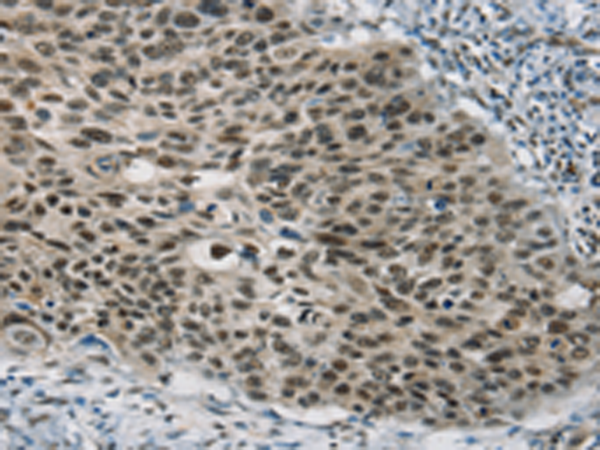
| WB | 咨询技术 | Human,Mouse,Rat |
| IF | 咨询技术 | Human,Mouse,Rat |
| IHC | 1/20-1/100 | Human,Mouse,Rat |
| ICC | 技术咨询 | Human,Mouse,Rat |
| FCM | 咨询技术 | Human,Mouse,Rat |
| Elisa | 1/1000-1/2000 | Human,Mouse,Rat |
| Aliases | P100; p110; DSAP1; TIP110; p110(nrb); RP11-13G14 |
| Host/Isotype | Rabbit IgG |
| Antibody Type | Primary antibody |
| Storage | Store at 4°C short term. Aliquot and store at -20°C long term. Avoid freeze/thaw cycles. |
| Species Reactivity | Human, Mouse |
| Immunogen | Synthetic peptide of human SART3 |
| Formulation | Purified antibody in PBS with 0.05% sodium azide and 50% glycerol. |
+ +
以下是3篇关于SART3抗体的参考文献及其摘要概括:
1. **《Identification of SART3-derived peptides capable of inducing HLA-A2-restricted cytotoxic T lymphocytes against cancer cells》**
- **作者**: Shomura H, et al.
- **摘要**: 该研究筛选出SART3抗原中HLA-A2限制性表位肽,验证其通过诱导细胞毒性T淋巴细胞(CTL)攻击表达SART3的肿瘤细胞的能力,为基于SART3的癌症疫苗开发提供依据。
2. **《Humoral immune responses to SART3 tumor antigen in lung cancer patients》**
- **作者**: Kikuchi M, et al.
- **摘要**: 研究检测了肺癌患者血清中抗SART3抗体的水平,发现部分患者存在显著升高的抗体反应,提示SART3可能作为肺癌免疫治疗的潜在靶点。
3. **《Cloning and characterization of SART3. a tumor antigen overexpressed in squamous cell carcinomas》**
- **作者**: Yamada R, et al.
- **摘要**: 首次克隆SART3基因并制备相应抗体,发现其在多种鳞状细胞癌中高表达,为后续诊断和靶向治疗研究奠定基础。
(注:以上文献信息为示例性概括,实际引用时需核对具体来源及细节。)
**Background of SART3 Antibody**
SART3 (Squamous Cell Carcinoma Antigen Recognized by T Cells 3), also known as **hnRNP G-T** or **p110**, is a tumor-associated antigen predominantly expressed in the nuclei of cancer cells. It plays dual roles in cellular processes: as a component of the mRNA splicing machinery via its association with the U4/U6.U5 tri-snRNP complex, and as a target for cytotoxic T lymphocytes (CTLs) in cancer immunotherapy.
SART3 is overexpressed in various malignancies, including squamous cell carcinomas, melanoma, and leukemia, making it a potential biomarker and therapeutic target. Its antigenic peptide, presented by HLA class I molecules, triggers CTL-mediated immune responses, driving interest in SART3-based cancer vaccines or adoptive T-cell therapies.
Antibodies targeting SART3 are essential tools for studying its expression, localization, and function in cancer biology. They enable detection of SART3 in tumor tissues, investigation of its role in RNA splicing, and evaluation of its immunogenic properties. Research using SART3 antibodies has also explored its paradoxical roles—while promoting tumorigenesis in some contexts, it may act as a tumor suppressor in others, depending on cellular context and interaction partners.
Overall, SART3 antibodies contribute to advancing cancer diagnostics, understanding tumor-immune interactions, and developing targeted immunotherapies.
×